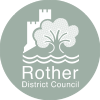This news article is more than 6 months old
We’ve all heard the phrase ‘Reduce, Reuse, and Recycle’, and many of us have worked admirably to incorporate the concept into our day-to-day lives.
Much of the focus has been on how to make these changes at home, yet domestic waste isn’t the only problem we face. According to UK Government statistics released in March 2020, it is estimated that the UK generated 41.1 million tonnes of commercial and industrial (C&I) waste in 2016, climbing to 36.1 million tonnes in 2017 and 37.2 million tonnes in 2018.
To stop this trend continuing, we need to reduce, reuse, and recycle waste in workplaces as well as in our homes. Rother District Council declared a Climate Emergency in September 2019 and has pledged to do what it can to make Rother District carbon neutral by 2030, including by reducing the amount of materials it uses and the waste it creates.
This declaration led to the formation of the Climate Change Steering Group, the appointment of the Environment and Policy Manager, and the development of the Rother Environment Strategy which was approved and adopted by the Council in September 2020.
At its last meeting in November, the Climate Change Steering Group made a ‘Paperless Pledge’ – a promise that Climate Change Steering Group Members would no longer receive printed materials unless they specifically required them for issues such as health or poor eyesight.
Councillors have been provided with laptops and tablets which allow them to use a mixture of a paperless app and video conferencing to access their meetings and agendas. The Council shared their experiences as part of the current government consultation on local authority remote meetings that is open until 17 June. It is proposed to roll this out to all Rother Councillors and for all Committees to be paperless by default from the new civic year in May 2021.
Council Officers went paperless in February 2021 but we’re proud to have staff and teams who have made great efforts to reduce both consumption and waste within their teams well before this date.
The Council’s Customer Services Team has made a remarkable impact already. So far, the team has reduced their annual use of A4 sheets from 60,000 to 10,000 and their use of A3 sheets from 500 to zero, and hope to reduce their consumption further as their initiatives progress. Where there are still printing requirements, black and white printing is now used by default to help reduce ink consumption.
Much of this progress has been made by introducing a process of scanning and emailing documents rather than making copies for residents or use internally, and there are plans to introduce a ‘self-scan’ station in the Council Reception in the next two months.
These initiatives not only reduce paper, they reduce the amount of ink used and the number of deliveries required – not only reducing the Council’s carbon footprint, but budgetary costs too.
We hope local residents and businesses will join us in making their own ‘Paperless Pledge’.
If you have any queries about the issues discussed in this article, please get in touch at Climate.Emergency@rother.gov.uk.
Published: 20th May 2021

